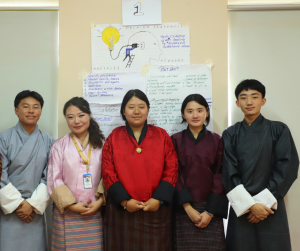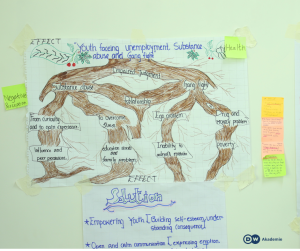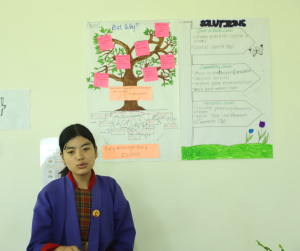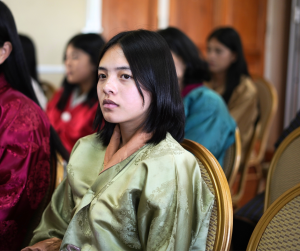July e-News
Youth Initiative 2025: The Ripple Camp
A transformative six-day programme designed to amplify youth voices and equip young people with leadership, advocacy, and civic engagement skills brought together diverse youth from across Bhutan. The camp created a safe and engaging space for youth (18-24 years) to critically examine the pressing issues affecting their lives and communities. Youth reflected on their roles as active citizens and co-creators of social change in their communities. A highlight of the programme was the Youth–Parliamentary Engagement Forum, which gave participants a unique opportunity to visit Bhutan’s Parliament House, witness live deliberations, and voice their concerns directly to Members of Parliament. Students engaged with Members of the Parliament in meaningful dialogue, asking questions about democratic processes, gender representation, and youth inclusion in policy-making. One participant, Karma Yangchen, shared, “Engaging in youth parliamentary sessions is very important because it helps represent the voiceless youth across the nation.”

Throughout the camp, participants identified and discussed major social challenges such as easy access to clubs and alcohol by underaged children, calling for stricter ID verification and digital checks, teenage pregnancies and early marriages, advocating for open parent–child conversations, inclusion of Comprehensive Sexuality Education in schools, and youth exclusion from local decision-making, pushing for youth representation at community and national levels. They also raised concerns around gang violence, mental health, and the bias against students pursuing Arts and Humanities studies, highlighting the need for career guidance, Technical and Vocational Education and Training (TVET) awareness, and inclusive opportunities.
These discussions culminated in actionable policy recommendations addressing issues at the individual, community, and national levels. Suggestions included establishing 24/7 counselling services, youth committees at gewog and dzongkhag levels, integrating youth perspectives in planning spaces, launching a National Parenting Education Programme, and providing targeted scholarships and career pathways for arts students.


This year’s Youth Initiative, implemented jointly by DW Akademie and BCMD with funding support from the EU under the project “Building Inclusive Democracy: Civil Society, Parliamentarians, Media, and Youth Strengthen Good Governance in Bhutan”, was about creating momentum for change. Youth participants built confidence, forged meaningful friendships, and discovered that even the smallest ripple can spark powerful social transformation. As one participant, Rada Om, beautifully expressed, “Each conversation and every insight helped illuminate paths we may not have seen before.”
Youth Summit 2025: Voices for Change
The Youth Summit 2025, jointly organised by the Bhutan Centre for Media and Democracy and UNICEF Bhutan, brought together 45 students from 13 schools to address some of Bhutan’s most pressing community challenges. Using hands-on participatory methods like social mapping, public service delivery analysis, gender, and environmental analysis, students uncovered systemic issues in education, health, gender equality, disability inclusion, youth protection, and mental well-being. The summit empowered young people by making them aware about and equipping them with skills to identify issues, design actionable solutions and translate their lived experiences into policy-level recommendations.

The students developed Community Development Plans featuring practical ideas such as rural teacher retention packages, stronger mental health services in schools, building disability-friendly infrastructure, and stricter enforcement of laws preventing the sale of tobacco and alcohol to minors. “We are not just highlighting problems, we are offering clear, data-backed solutions,” shared Sonam Kuenzang from Karma Academy. This spirit of solution-oriented leadership was evident throughout the summit.

Students also voiced concerns about education quality and rural inequities. “When our Maths teacher teaches Dzongkha, and our matron teaches Economics, how can we succeed in board exams?” a student from Wanakha Central School (is it Central or MSS- give the school name) asked, highlighting the urgent need for trained and subject-specific teachers in rural schools. Others called for reforms to ease academic pressure. “Education should build us, not break us. Creativity, rest, and care are not distractions; they are essentials,” a participant said, referring to the need for balanced, supportive learning environments.

The Youth Summit 2025 demonstrated that Bhutanese youth are capable of thinking critically and objectively and are powerful agents of change. Their evidence-based recommendations and rich lived experiences call for immediate action to build a more inclusive, equitable, and resilient Bhutan.
Empowering Teacher on Media and Information Literacy
The Bhutan Centre for Media and Democracy successfully conducted the second batch of its Training of Trainers (ToT) on Media and Information Literacy (MIL) from 7–11 July 2025 in Trongsa. This five-day residential training brought together twelve participants, including school principals, Media and Democracy Club (MDC) coordinators, and teachers from Samtse, Trongsa, and Trashigang. The initiative aims to promote democratic participation and critical thinking among youth by equipping educators with the resources needed to help students navigate a complex and fast-evolving media landscape and become responsible consumers of news.

The programme introduced participants to foundational MIL concepts such as misinformation, disinformation, propaganda, and information disorder, while examining how media ownership and digital manipulation shape public discourse. Participants actively explored ways to help students critically assess media messages and engage responsibly with online content. Hands-on workshops in news writing, photo storytelling, and vlogging enabled participants to develop practical skills that they can transfer to their students. Using mobile technology, teachers learned to produce stories and to deconstruct the media production process. Additionally, the ToT placed a strong emphasis on facilitation and participatory teaching methodologies. Through peer teaching, role plays, and collaborative planning, participants practised running MDC sessions that are dynamic, inclusive, and student-driven.

In a powerful visioning exercise, educators set concrete goals for revitalising or launching MDCs in their schools by September 2025. These goals include integrating MIL into classroom teaching and fostering safe spaces for youth voices. “Media is more than entertainment. It’s a powerful tool to promote democracy, shape opinions, and build informed communities,” shared Mr. Sonam Jigme, Principal of Langthil Lower Secondary School in Trongsa. Other participants expressed urgency in guiding students on the ethical and responsible use of social media amidst rising misinformation. Many left the training motivated to engage their students in media creation as a means of building confidence and civic awareness.

This training is part of the European Union-funded project, “Building Inclusive Democracy: Civil Society, Parliamentarians, Media and Youth Strengthen Good Governance in Bhutan”, implemented by BCMD and DW Akademie to strengthen youth engagement, media literacy, and democratic values in Bhutan.
